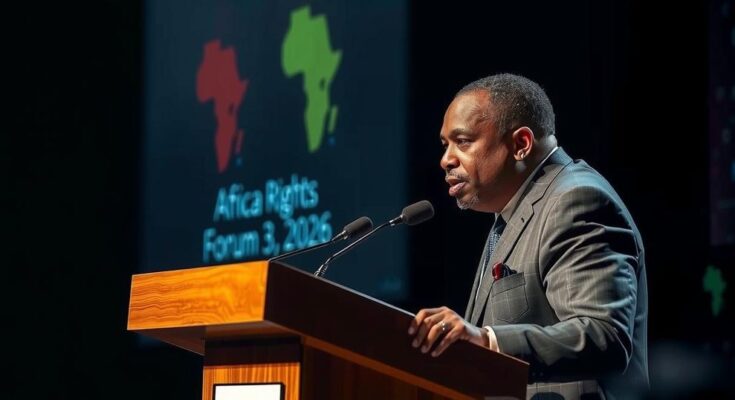During the 3rd African Business and Human Rights Forum, Olof Skoog highlighted the critical link between economic growth and human rights in Africa. He introduced new EU legislation aimed at ensuring corporate responsibility and urged businesses to actively promote human rights. The EU’s strategic initiatives demonstrate a commitment to helping African states enhance their business practices in alignment with global human rights standards, fostering a future of dignity and equality.
At the 3rd African Business and Human Rights Forum in Nairobi, EU Special Representative for Human Rights Olof Skoog emphasized human rights’ pivotal role in crisis management, highlighting Africa’s progress in adopting human rights frameworks. Every societal challenge, from health to environmental issues, stems from human rights violations, and businesses must actively promote rights rather than merely avoiding harm. With Africa’s youth driving economic growth, corporations face scrutiny for their human rights record, underscoring the forum’s importance in addressing these challenges collectively. Skoog announced the EU’s Directive on Corporate Sustainability Due Diligence, effective in 2024, which will compel companies to rectify adverse human rights impacts across their global operations. This legislation advocates for sustainability, steering businesses to foster engagement with local partners rather than withdrawal. He clarified that these measures aren’t a blockade against African markets but rather a path to elevate human rights standards beneficially to all stakeholders involved. He shared plans for a new pan-African Responsible Business Conduct program aimed at helping African businesses align with European partners’ legal expectations. Citing recent EU regulations like the Deforestation-free products Regulation, which ensures ethical sourcing, he highlighted the commitment to uphold human rights in Africa’s extractive industries. Skoog emphasized the necessity of laws to prevent human rights abuses in the supply chain, announcing the upcoming Forced labour product ban Regulation to combat exploitative practices. The EU’s trade agreements with Africa integrate human rights into economic partnerships, signifying a strategic shift toward equitable collaborations that respect core principles like labor standards and environmental protection. Another initiative, the Generalised Scheme of Preferences Plus, incentivizes African nations to embrace human rights in exchange for tariff-free trade with the EU. Highlighting the EU Global Gateway strategy, he pointed to an investment initiative worth €300 billion aimed at fostering sustainable growth in Africa while remaining steadfast against the donor-recipient model. Skoog concluded by stressing that Africa’s economic potential must align with upholding human rights, advocating for the intertwined nature of economic growth, civic freedoms, and social justice. He urged participants to harness collective efforts for sustainable solutions that elevate dignity and equality for all involved, creating a prosperous future.
The speech addresses the intersection of business and human rights, particularly in the African context. With the continent’s growing economic potential, Skoog recognizes the important role that businesses play in promoting human rights. The event coincides with the implementation of new legislative measures designed to ensure that companies adhere to human rights standards in their operations, especially concerning their supply chains. This framework is critical for fostering sustainable development and stability in African societies.
Olof Skoog’s address at the 3rd African Business and Human Rights Forum illuminated the vital connection between economic development and the respect for human rights. He urged collaborative efforts to forge a future where corporate accountability and ethical practices thrive alongside Africa’s burgeoning growth. The proposed EU directives and partnerships signify a commitment to creating equitable frameworks that promote human dignity, social justice, and sustainable prosperity across the continent.
Original Source: www.eeas.europa.eu



